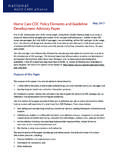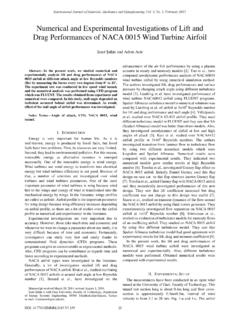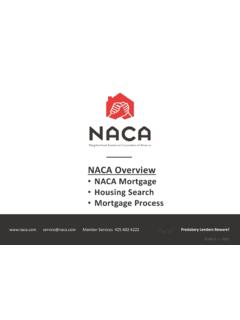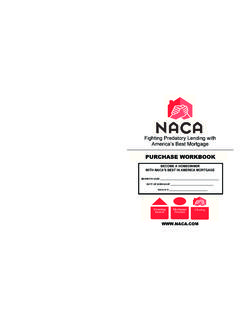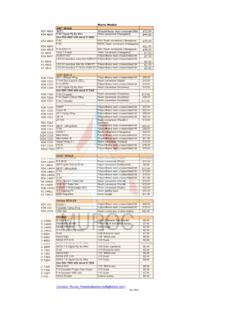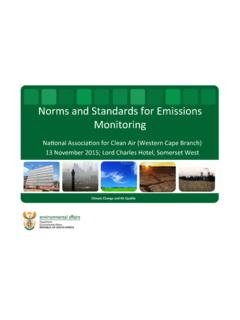Transcription of Aged Care Reform Series ‑ Wellness - naca.asn.au
1 NationalAGED CARE allianceAged Care Reform Series Wellness The National Aged Care Alliance (the Alliance) developed this paper to provide additional advice to Government, through The Hon Mark Butler, MP Minister for Mental Health and Ageing, as it considers the proposed aged care reforms from the Productivity Commission s Caring for Older Australians report which was released in August 2011. Wellness is one in a Series of six papers available on the Alliance website ( ), other papers in the Series include: Assessment and entitlement (including the Gateway), Financing aged care in Australia, Palliative Care, Quality of care and existing prevention, early intervention and Wellness programs and initiatives togetherWithin a national framework of active ageing where a Wellness philosophy is a central pillar of public policy and government departments are required to review policies to ensure they do not run counter to the philosophy but rather actively promote programs and initiatives to be the responsibility of the Australian National Preventive Health Agency.
2 This responsibility to be accompanied by a specific active ageing/ Wellness funding stream and resourcing for the Agency to take on this to be across the life course and targeted at critical times for intervention where evidence to this effect to include public campaigns to inform and change attitudes and expectations about ageing as well as encourage adoption by individuals of healthy lifestyles and other behaviours that are known to be associated with ageing philosophy to be adopted across the health and aged care system and care pathways developed that ensure whenever individuals experience a significant change in function that is not associated with a properly diagnosed advanced terminal or degenerative condition that they are given the opportunity to be reassessed and offered a service that is focused on rehabilitation/ , as discussed in more detail in relation to reablement , a national framework be developed for how the existing different restorative programs (TCP, GEM, Rehabilitation, homecare reablement ) be brought together into coherent regional service networks in which the target groups for each service and the reasons for referral to other services are clearly defined.
3 Ongoing research examining the cost effectiveness of different service models with different target groups, is however essential, as there is a significant and important gap in the evidence in this health and aged care professional and worker training to be framed within an active ageing/ Wellness to promote positive ageingNeed a range of initiatives (such as those found in the quick literature search done for the Alliance see appendix) that target lifestyle and other factors such as social connectedness and forward planning that have been shown to be related to health/functional/social/quality of life of these initiatives should be based on evidence of their effectiveness but there needs to nationalAGED CARE alliance2 Aged Care Reform Series Wellness be funding for their development and trialling as well as further funding for ongoing provision if demonstrated to be effective (too often programs are piloted, found to work but then are discontinued as the money was only for the pilot).
4 Initiatives at the early stage of ageing should just be elements within a range of active ageing initiatives that, as identified in response to the first question, are planned to be throughout the life course focusing on different elements at different times depending on what is most critical at different research examining when in the life course initiatives are most effective in terms of take up rate and impact eg. Advanced care planning, appointing an enduring Power of Attorney. In addition to this research, there needs to be education and mechanisms that encourage and support people to do this planning and appointing at the time they are diagnosed with a chronic or degenerative condition, rather than during the final stages of their life/conditions. The Alliance will consider these issues the Australian National Preventive Health Agency could be responsible for development of the national framework (KPIs etc) it could possibly be Medicare Locals who act as regional purchaser and co ordinator of these types of services/initiatives and take responsibility for ensuring that there is an appropriate range (to match their population profile) of programs operating within their region.
5 Medicare Locals could also be responsible for identifying service needs and filling the gaps, and for coordinating what is on offer given that not all programs are government funded eg. disease specific groups who raise money to be able to deliver programs or implement Ageing and the Economic Potential of SeniorsThe Minister s Advisory Panel for the Economic Potential of Senior Australians (EPSA) is likely to recommend the development and adoption across government of a Wellness /Active ageing framework. In line with this concept, EPSA is recommending looking at ageing across the life of a national program of Wellness /active ageing initiatives would need to be done in partnership with the specific diseases agencies, many of whom are already taking a life course approach. Connections and Opportunities with Primary Health CareThe establishment of Medicare Locals (MLs) and Local Hospital Networks (LHNs) as new regional infrastructure with coordination responsibilities provides opportunity to support greater collaboration between the health and aged care systems to overcome existing service gaps and limitations, and help ensure better access to well coordinated, and comprehensive, health care, within a framework that promotes is expected that as regional coordinators of health care services, core business for MLs and LHNs will include working:in close partnership with any future regional aged care coordination body ( the Gateway) that may be established, to ensure greater integration of health care and aged care services at a regional level.
6 This would include collaboration to determine local service needs and locally relevant service models, including service mapping and identifying and addressing service gaps; and nationalAGED CARE alliance3 Aged Care Reform Series Wellness to ensure strong integration at a local service level between health care services, aged care providers, and other relevant health and aged care sector agencies. For example, this may include supporting GPs to participate in RACF s Medication Advisory Groups to support quality use of medicines within the , working in partnership with the local aged care sector, can also perform a broader scope of functions to enhance the quality of care and quality of life, for aged care recipients. These include:Ensuring timely access to comprehensive GP and other primary health care services, by establishing locally appropriate solutions to address barriers to timely access to care.
7 Providing care coordination support for older Australians with chronic conditions and complex care needs living in the community to assist them to access a range of community based health services. Supporting the effective use of information technology, and the uptake of the ePCHR, to enable information sharing between service providers, including hospitals, pharmacies, primary care providers, RACFs, community care providers and, as appropriate, aged care coordinating/assessment bodies (currently ACATs, potentially the Gateway). reablement servicesReablement is the use of timely assessment and targeted interventions to: assist people to maximise their independence, choice and quality of life; appropriately minimise support required; thereby maximise the cost effectiveness of care and ensure people continue to actively participate and remain engaged in their local communities. The term reablement is currently only used to describe home care programs that take a restorative approach.
8 However, the definition could equally well be applied to other programs or services that focus on restoration ( transition care, restorative care, rehabilitation and GEM) as the principles and objectives appear to be essentially the same. The differences between the services appear to be mainly in the level and type of need of the target group, the staff mix and their level of specialisation, and, in the case of GEM, their location, as currently GEM is only an in patient service whereas the other three types of service are delivered in both community and hospital England, where there has been a Government funded initiative to assist councils (who are responsible for home care services) to develop these services, almost all councils are planning, implementing or running a reablement service. Most often these services target either individuals referred for home care from hospitals or from the community, less often both.
9 The reablement service (including the assessment) is delivered by non health professionals who have been trained in reablement , with allied health professionals (most commonly Occupational Therapists) available for advice and Australia, the Home Independence Program, the longest running home care reablement service in the country, is delivered by a multidisciplinary allied health team working in an interdisciplinary way ( only one care manager works with the client and delivers all interventions unless specialist referral required). However, other Australian reablement programs do not necessarily have health professionals as the Care Managers and last year Silver Chain was funded by Health Workforce Australia to develop training for non health professionals to be able to deliver the program with the health professionals being available for mentoring, support and specialist CARE alliance4 Aged Care Reform Series Wellness Home care reablement has been shown in both the UK and in Australia to improve clients functioning and quality of life and reduce the need for ongoing home care services.
10 Its effectiveness in terms of reducing service use and hence the cost of care has been found to last for up to five years so reablement can generally be said to be appropriate for older people such as those: living in the community who are beginning to find daily tasks more difficult or who experience an increase in the difficulty with which they perform everyday activities;who have been in hospital and have been discharged and need to regain confidence and need assistance to regain functional abilities and get back to their usual routineshave had an injury or illness needing support to regain social connections needing to learn daily living skills that they have never previously needed (eg. when a man is widowed and does not know how to cook and housekeep)On the other hand it may not be appropriate for older people who:are terminally ill (unless they have asked for assistance to remain as independent as possible when aids and equipment and exercise can be appropriate)have an advanced neurodegenerative disorder.

